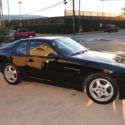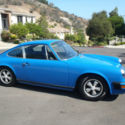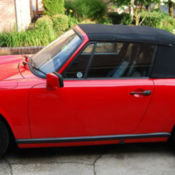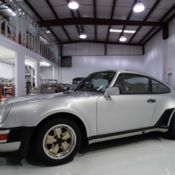1 of only 99 Porsche 968 produced with M030, exceptional collectible
- Make: Porsche
- Model: 968
- SubModel: M030
- Type: Coupe
- Year: 1993
- Mileage: 117000
- VIN: WP0AA2964PS820424
- Color: Black
- Engine size: 3.0 Liter
- Number of cylinders: 4
- Power options: Air Conditioning, Cruise Control, Power Locks, Power Windows, Power Seats
- Drive type: RWD
- Interior color: Black
- Drive side: Left-hand drive
- Safety options: Anti-Lock Brakes, Driver Airbag, Passenger Airbag
- Options: CD Player, Leather Seats, Sunroof
- Vehicle Title: Clear
- Location: Dallas, Texas, United States
Description
The 968's basic styling was an evolution on that of the outgoing 944, itself based on the earlier 924. In an attempt to create a "family resemblance" between models and associate it with the luxury928gran turismo, elements were borrowed from its upscale sibling. Others included a swooping headlamp design inspired by the959later incorporated in theType 993911.
The 968 was powered by an updated version of the 944'sstraight-fourengine, now displacing 3.0L with 104mm bore, 88mm stroke and producing 240PS (237bhp; 177kW). Changes to the 968'spowertrainalso included the addition of Porsche's then-newVarioCamvariable valve timingsystem, newly optimized induction andexhaust systems, a dual-mass flywheel, and updated engine management electronics among other more minor revisions. The 968's engine was the fourth-largest four-cylinderand highest horsepower ever offered in aproduction carup to that time. A new 6-speedmanual transmissionreplaced the 944's old 5-speed.The VarioCam timing system was first introduced on the 968 and would later become a feature of the Type 993 air-cooled six-cylinder engine.
Much of the 968's chassis was carried over from the 944S2, which in itself shared many components with the 944 Turbo (internally numbered951). Borrowed components include theBrembo-sourced four-pistonbrake caliperson all four wheels,aluminiumsemi-trailing arms and aluminum front A-arms, used in aMacpherson strutarrangement. The steel unibody structure was also very similar to that of the previous models. Porsche maintained that 80% of the car was new.
The 968 also featured numerous small equipment and detail upgrades from the 944, including a Fuba roof-mounted antenna, updated single lens tail lamps, "Cup" style 16" alloy wheels, a wider selection of interior and exterior colors, and a slightly updated "B" pillar and rear quarter window to accommodate adhesive installation to replace the older rubber gasket installation.Only 3,783 were made in 1993, with only a little over a 1,000 going to the US and Canada, truly a remarkable collectors item. While lacking the wider ranging appeal of the 911, the 968 has nonetheless carved out its own niche in the hearts of enthusiasts.This is likely due to the 968's unique combination of speed and practicality, and low production numbers.Clean, low mileage examples have become extremely scarce and demand a high price.
 One of a kind 968 Porsche, M030, 2nd owner, exceptional collectible.
One of a kind 968 Porsche, M030, 2nd owner, exceptional collectible.
Mileage: 117000
 1993 PORSCHE 968 M030 Equipment Code 220 LSD G60
1993 PORSCHE 968 M030 Equipment Code 220 LSD G60
Mileage: 148,215
 76 Porsche 912E #1464 of only 2092 produced Rust Free Calif Porsche NR
76 Porsche 912E #1464 of only 2092 produced Rust Free Calif Porsche NR
Mileage: 56400
 1983 Porsche 911 SC Convertible. Red. Beautiful Collectible Porsche
1983 Porsche 911 SC Convertible. Red. Beautiful Collectible Porsche
Mileage: 130,500
 Turbo Charged, 247hp, Top Speed of 162mph and the M030 package....
Turbo Charged, 247hp, Top Speed of 162mph and the M030 package....
Mileage: 102,896
 1992 PORSCHE AMERICA ROADSTER ** ONE OF ONLY 250 PRODUCED **
1992 PORSCHE AMERICA ROADSTER ** ONE OF ONLY 250 PRODUCED **
Mileage: 48,800
 Porsche 928 GTS ( One of the rarest color combinations produced)
Porsche 928 GTS ( One of the rarest color combinations produced)
Mileage: 52,943
 1966 Porsche 912 SWB Coupe - Produced 10/1965
1966 Porsche 912 SWB Coupe - Produced 10/1965
Mileage: 73,000
 1976 PORSCHE 930 TURBO CARRERA, ONE OF ONLY 530 PRODUCED!
1976 PORSCHE 930 TURBO CARRERA, ONE OF ONLY 530 PRODUCED!
Mileage: 35,735
 1970 porsche 914-6 One of a kind exceptional restoration
1970 porsche 914-6 One of a kind exceptional restoration
Mileage: 2,500












